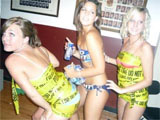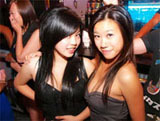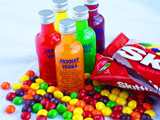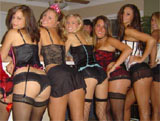Wales Tales
By: The Rulemaster
This drinking game called Wales Tales, submitted by one of our users, is based on the medieval days and the Knights of the Round Table. Here is the full description on how to play and all the rules.

The Story
Long, long ago, in days when brave knights and chivalrous noblemen roamed the land, the countryside was divided into many kingdoms. The mightiest and most glorious of these kingdoms was ruled by a wise and judicious king. The kingdom was the Kingdom of Camelot, and its king was King Arthur. Camelot was a realm that grew rich and prosperous under the leadership of King Arthur and his council of nobles. These were the Knights of the Round Table called this because they sat at a round table so that no man among them would be viewed as having higher rank than his peers. Camelot was a land of peace for many years and then came the Holy Wars.
King Arthur left Camelot to lead his men in what was thought to be the most noble of campaigns but some knights stayed behind to guard their precious kingdom. Upon his return, King Arthur's greatest desire was to rejoin his wife, Lady Guinevere. Imagine his horror then, when he learned that she had laid down with another. King Arthur was furious, and called an emergency meeting of the Knights of the Round Table, for he knew that only one of his knights would have been able to charm Lady Guinevere. The knights did not know why they had been called, but all were overcome with a sense of dread. Hearing of King Arthur's anger, which he had never before shown, they trembled in anticipation of his fury.
A chill filled the room as King Arthur spoke: Which man among you has defiled my wife?' Sir Gallahan, unable to contain his fear, sprung to his feat and pointed at Sir Lancelot. 'It was him', he shouted. And in one swift movement King Arthur rose, drew his sword the mighty Excalibur, and lopped off Sir Gallahan's arm at the elbow, and as he shrieked in pain the dead limb fell to the ground with a thud. 'We are all gentlemen here!', the King shouted as his eyes searched the eyes of his men. 'We do not point!'
Stunned, the men fell silent. Regaining his composure, Sir Lancelot then accused another knight to cast blame away from himself, who accused another, who accused another. And so it went, each man passing on the blame.
Basic Rules
Have plenty of beer available to start this drinking game. The game is presided over by the 'Pretty Prince'. He designates a direction of play. He also may command anyone to drink at any time for any reason, or no reason at all. 'Socials' may be called by the Pretty Prince at any time. All players raise their glasses and take a sip.
The Pretty Prince may call for a 'waterfall' at any time. He starts drinking, designating a direction for the waterfall to flow. The adjacent Knight in that direction must start drinking as does the following Knight and so on. Each Knight isn't allowed to stop drinking until the Knight before him does, starting with the Pretty Prince. Therefore it is possible for the full Court to be drinking almost immediately, but the last Knight can't stop until all those before him have stopped one by one.
Each Knight 'accuses' another Knight by calling out a number. However, Knights are not assigned a universal number. Rather the number an Accuser calls out signifies the number of seats away the Accused Knight sits relative to the Accuser.
In the rules, examples will be given with 'Gentleman's Tales'. The Accuser will cast blame, e.g. 'Two, sir!' . You may not call a number higher than the number of positions in the Court. The Accused responds with a denial, e.g. 'Nay, sir!' The Accuser counters with a query, e.g. 'Who sir?' The Accused then passes on the blame, e.g. 'Three sir!'
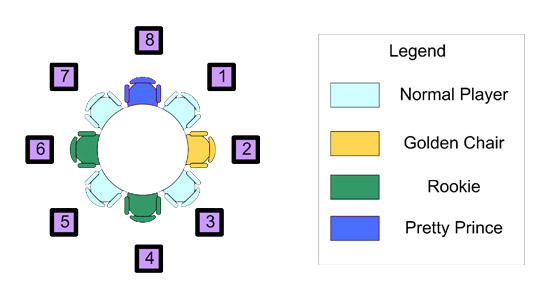
Penalty Situations
Game Continuity Errors:
- Being Slow or Silent: This is a game of speed. If the Accused doesn't respond before two other Knights gesture at him, he must drink 'for being slow'.
- Misspeaking: If a Knight misspeaks he must drink. For example he says 'Who?' instead of 'Nay!'.
- Shit In Mouth: If a Knight stumbles over his own word, stutters, or mumbles, he can be told to drink 'for shit in mouth'.
Bad Etiquette:
These events deserve a drink but do not affect the ability of the Court to continue the game while the violator is told to drink.
- Chirping: If a Knight mistakenly answers for the Accused, he drinks for 'chirping'.
- ounting: This is a game of numbers and memory, therefore, if you are observed 'counting' (even if just by your eyes moving around), you will be told to drink. It may be helpful to the Accuser to intentionally avoid eye contact with the accused.
- Pointing: Due to our respect for Sir Gallahan's injury, in this game when we gesture at someone, we do so with an elbow. The penalty for pointing or gesturing with anything other than an elbow is a drink.
- Crossing Elbows: Sitting in a circle, all men to the accuser's left are gestured at with the left elbow, and all men to the right are gestured at with the right elbow. The penalty for gesturing with the wrong elbow is a drink.
- False Accusation: A Knight who wrongly accuses another Knight (e.g. points an elbow at the wrong guy) can be told to drink for 'false accusation'.
- Profanity: No curse words are allowed. Knights may be told to drink 'for profanity'.
- Defense: Anyone who argues over whether they need to drink, no matter if they're right or wrong, can be told to drink 'for defense'.
- Delay of Game: Any interruption can be reason to make a Knight drink 'for delay of game'.
Spitting of Beer
If a Knight calls someone who is drinking before they have swallowed, the drinker may spit his beer on the Accuser. This is to prevent Knights from having to drink continuously because they can't respond in time due to having a drink in their mouth. Beerless spit is not allowed. Once you've swallowed your beer, your chance has passed. And no, you can't hold the beer in your mouth and wait if you do that, the Knight who got spat on can then spit on you.
Examples:
- In a situation where one Knight 'chirps' and the Knight who should have answered also responds, there is no 'game continuity error' and play can continue. The chirper drinks, but the chirper would not be allowed to spit if called on while drinking.
- In a situation where one Knight chirped and the Knight who should have responded is silent because he is confused, both would have to drink, but only the Knight who was silent would have committed a 'game continuity error', so he (and only he) could spit beer if someone calls him right then while he's drinking.

The Risks of Slow Drinking
- The 'One Drop' Rule: Anyone at any time may reach for another Knight's beer and pour the remainder over their own head. Unless the victim has Tapped Out (see below), if even on drop spills onto the thief's head, the victim must then chug a full beer. You may not grab a drink directly out of a Knight's hand when spilling on your own head to make them chug. The glass must have been set down by the victim and released from the victim's grasp. No pussy moves will be tolerated, like tilting your head back to avoid getting the beer on your clothing. Note that the full contents of the glass must be poured over one's own head. Just because there's a 'one drop' rule doesn't mean you get away with not dousing yourself. This is because the rule is meant to prevent Knights from nursing one beer all night ' not to encourage endless group chugging. The thought is that thieves won't willingly pour large amounts of beer over their own heads (heh heh, but some do!), and will respect beer (and the money it costs) enough not to waste it. Therefore you should be safe as long as you finish your glass once it's getting low.
- The Cyrus Roohi Rule: In recognition of the fact that some damned fools will pour beer all over themselves and your carpet and waste all the beer just to make the whole group chug all night, the Court may designate the starting level at which a glass may be robbed (e.g. 'a glass cannot be robbed before the level drops to one quarter of the glass remaining'). The Cy Rule must be called at the start of the game ' otherwise a new Court must be called to enact it. There is a counterbalance to the factors limiting chugging: Recall that the Pretty Prince can use his power to make anyone drink without a reason at any time to speed up a Knight's drinking too.
- Tapping Out: Knights are especially vulnerable when they finish a glass. Therefore, Knights should protect themselves by designating the glass as empty by 'tapping out' ' turning the glass sideways or upside down and touching the rim of the glass to the table, or to the Knight's own head. Tapping out also applies to pitchers, with the unfortunate result that if you happen to be pouring the last of a pitcher and someone catches you not tapping it out, you could find yourself chugging a full pitcher. However, one can't pour a partial pitcher over one's own head and expect the last pourer to chug a pitcher, in the way one could with a partially full glass. When a Knight chugs, the rest of The Court will sing as a group, 'Here's to Brother [name], Brother [name], Brother [name]! Here's to Brother [name] the worst of them all! He eats it, he beats it, he sorely mistreats it! Here's to Brother [name] the worst of them all! Now drink motherfucker, drink motherfucker, drink motherfucker, drink!' The Court keeps repeating the 'Now drink motherfucker'' part until the glass or pitcher is empty. To keep the game moving in the event that Knights have to drink, one of three device may be used to resume the round.
- The last Knight to correctly respond may restart the round by saying 'last correct calls tales on [number] sir!' If there is simply too much confusion, the Pretty Prince may accuse a new Knight, saying 'Pretty Prince calls Tales on [number] sir!'
- Point of Order: A Knight may petition for a pause by calling 'Point of Order!'. When this is done he must be acknowledged by the Pretty Prince. A Point of Order may be called.
Beginning a Game
To start the drinking game Wales Tales the first thing you must do if pick the Pretty Prince. The Pretty Prince normally is whoever knows the most rules or actually calls the court. If there are multiple people of equal valor that know the game then than compete for the position by seeing who has the 'fastest chug.'
A game is begun with a 'social' called by the Pretty Prince. Then the Pretty Prince then recites the story above. The Pretty Prince will then raise his glass and announce 'Drink, Count, Start!', takes a sip, and 'calls The Court'.
- Calling a Court : This is done by saying 'Wales Tales! Prince of Wales calls this Court of [direction e.g. Regular Rotational (clockwise); Reverse Rotational; Rebounding Rotational], [type of game] Tales [with the following added conditions] with a court of [counts Knights aloud, gesturing with the appropriate elbow, and notes 'golden chair at my (position number)' and 'Rookie at my (position number) if appropriate], Pretty Prince makes [total number] (gestures to his own seat with both elbows). Pretty Prince calls Tales on [position number, and affixed lingo (such as 'sir') if appropriate].
Example:
Prince of Wales calls this court of Regular Rotational, Gentleman's Tales with a rebounding whip with a court of one, Golden Chair at my two, three, Rookie at my four, five, Rookie at my six, seven, and Pretty Prince makes eight (gestures to his own seat with both elbows). Pretty Prince calls Tales on three, sir!
Advanced Rules
The Whip
In an attempt to keep the momentum of play going after an error, the Knight sitting adjacent in the direction of play to the Knight who's drinking must avoid being 'whipped'. Before the drinking Knight puts his glass down, the adjacent Knight must say 'Whoops, [number] sir!'. If not, he must drink, and the whip moves to the next Knight in the direction of play. If more than one Knight is drinking for error, the whip is attached to the Knight who should have been responding. If there is confusion as to where the whip is, or the whip is not introduced as a rule, the last Knight to correctly respond may restart the round by saying 'last correct calls tales on [number] sir!
Jamming
the Accuser may say both of his lines at once (e.x. 'Two Sir! Who Sir!') in an attempt to confuse the Accused. The Accused must respond with both of his lines at once (e.x. 'Nay Sir! Three Sir!')
Rookies
New Knights are known as Rookies. Rookies may not be jammed. The Accuser should drink for attempting to jam a Rookie . Knights may request a vote to revoke another Knight's Rookie status by calling 'Point of Order!' and asking for such a vote. If approved by the Pretty Prince, all Knights hold out their fists horizontally, and when the vote is called, give a thumb up or down. Majority wins. Once a Rookie attempts to jam a regular Knight, that's usually a sign that it may be time for the Knights to take a vote on revoking his Rookie status
Golden Chairs
To make the game more challenging, one or more 'Golden Chairs' may be introduced. Golden Chairs are placeholder spots where no Knight is physically sitting. Accuser who calls the Golden Chair then assumes the role of the Accused, having a conversation with himself in an attempt to confuse other Knights before calling another Knight from the position of the Golden Chair. There need not be an actual chair or space in that position, but that would be helpful for Rookies. In a further attempt to confuse the other Knights, a Knight may also call themselves from the Golden Chair, or call another Golden Chair from the Golden Chair, such that when another Knight is finally called, it may be difficult to tell what chair that call originated from.



 Themes
Themes Games
Games Drinks
Drinks Music
Music